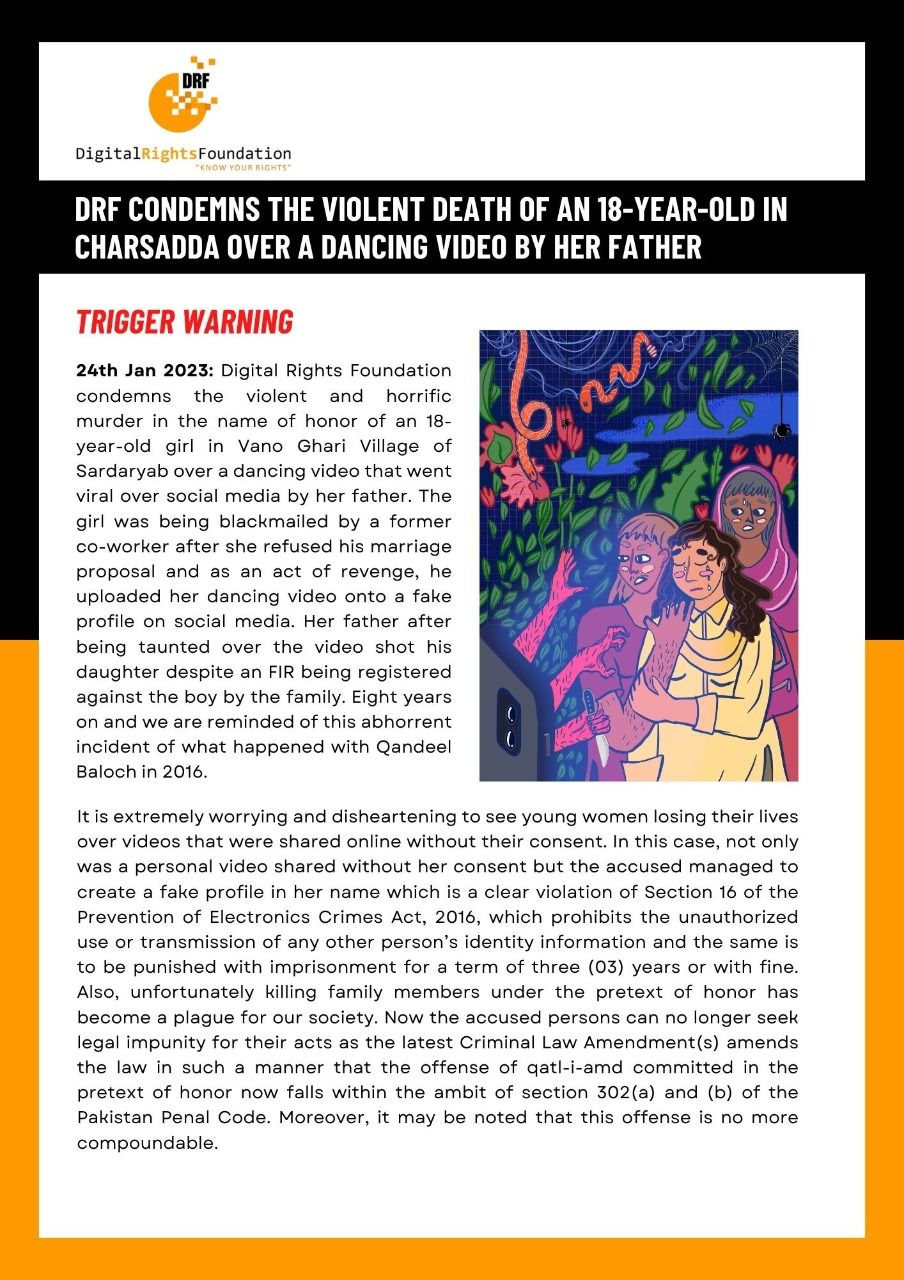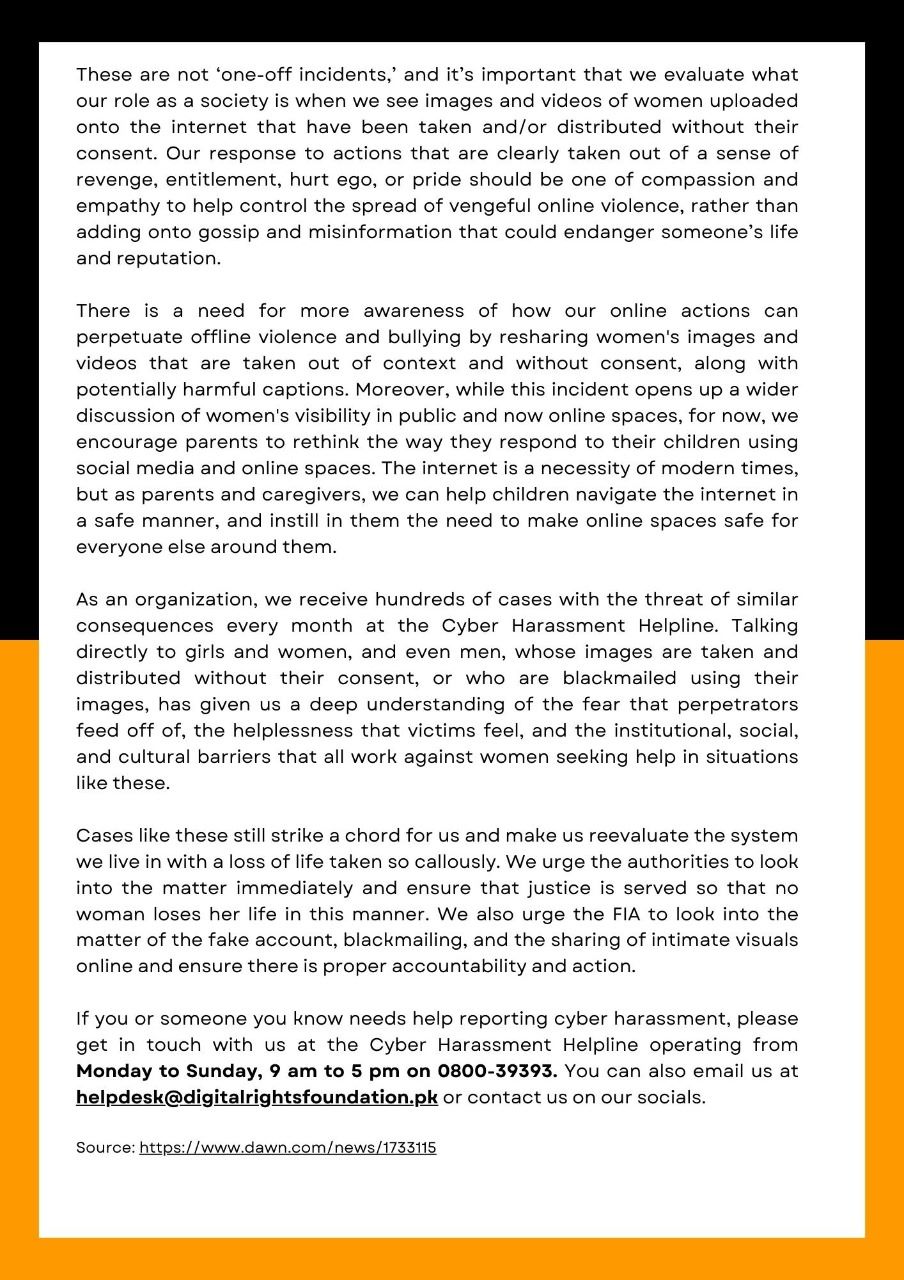July 15, 2024 - Comments Off on Technology-facilitated Gendered Surveillance on the Rise in Women’s Private Spaces
Technology-facilitated Gendered Surveillance on the Rise in Women’s Private Spaces
7th June 2024
Pakistan: Digital Rights Foundation (DRF) is extremely alarmed and concerned about the ongoing surveillance of women and girls in private spaces through unregulated CCTV cameras in women's shelters, hostels, universities and salons, invading their right to privacy and dignity in private spaces. Women are already exceedingly subjected to gender based violence, harassment and social surveillance by society which in turn pushes them to seek refuge in gender segregated private spaces such as these.
According to the 2023 Gender Gap report Pakistan ranks at 142 out of 146 countries in terms of gender parity, including economic participation and opportunity, educational attainment, health and survival, and political empowerment. With women’s participation being severely limited and restricted in the country, they are significantly more financially dependent, prompting them to look towards spaces like Dar-ul-Amans (designated shelters for women in distress) for shelter and protection. Women residing in Dar-ul-Amans are largely vulnerable, particularly when they face little to no familial support and are seeking refuge.
Dar-ul-Amans in the country have been purpose-built to provide state-sanctioned support at an institutional level. In light of this, the use of unregulated CCTV cameras is flagrantly threatening and targeting women’s dignity and privacy. This an active and gross violation of their constitutional rights as granted under Article 14. Additionally, S. 9(5) of the Guidelines for Dar-Ul-Aman in Punjab also recognizes these rights and states that ‘violation of a resident’s privacy shall be considered as misconduct and the Social Welfare Department shall be justified in taking appropriate action in this regard.’
Women living in these shelters have also complained of gross mistreatment and abuse at the hands of those in charge at these centers. Days before the Rawalpindi Dar-ul-Aman incident, another incident of a similar nature took place in one of Lahore’s women’s hostels where hidden cameras were found on the premises of the building. These repeated instances of CCTV cameras being installed in private spaces under the guise of safety and the footage being misused , serve as a direct invasion of privacy and threat to women’s physical safety and create a hostile environment of mistrust and insecurity amongst women at large.
There have even been reports of instances of CCTV cameras being installed to surveil women in salons, where the footage and data has later been employed as blackmail material. In 2019, students from University of Balochistan (UoB) protested in the wake of CCTV camera footage being used by security personnels to sexually harass and blackmail students, particularly the young women on campus. In the past, we have seen that the Senate Standing Committee on Human Rights have taken notice of these issues and we urge them to exercise their position to do the same now and investigate these heinous acts of violation against women’s privacy at Dar-ul-Amans and other private spaces.
DRF's Cyber Harassment Helpline since its inception has received 16,849 complaints from across Pakistan, with 58.5% of the complaints having been received from women across the country. Over the years we have received a number of complaints where women have repeatedly complained about being targeted through surveillance & spyware technologies injected to their devices by individuals who are close to them in order to control and monitor their movements and activities. We have also witnessed a rising trend where women were captured on camera without their consent in addition to the misuse of their intimate images through blackmail and intimidation. In some instances these images are further manipulated and doctored through the use of generative AI tools to create deep fakes visuals and imagery.
We strongly urge transparent and urgent investigations into these violative incidents which are (of employing the use of unregulated CCTV cameras to violate women’s privacy) contributing to increased gender surveillance in the country. DRF has long been advocating for a human rights centric personal data protection law for this very reason, which needs to be centering the privacy and data of vulnerable communities including women, gender minorities and marginalized groups. We urge the current Ministry of Human Rights (MoHR) and Ministry of Information Technology & Telecommunication (MoITT) to involve women rights and digital rights groups in consultations around the proposed data protection bill in order to address the existing gaps. Moreover, we urge the National Commission on Human Rights (NCHR) and National Commission of Women Rights (NCWR) to look into the matter post haste and ensure that women are not subjected to gender based violence at the hands of technology, particularly in the form of their surveillance in private and public spaces.
Digital Rights Foundation is a registered research-based NGO in Pakistan. Founded in 2012, DRF focuses on ICTs to support human rights, inclusiveness, democratic processes, and digital governance. DRF works on issues of online free speech, privacy, data protection and online violence against women.
For more information log on: www.digitalrightsfoundation.pk
Contact
Nighat Dad
Seerat Khan
Anam Baloch






